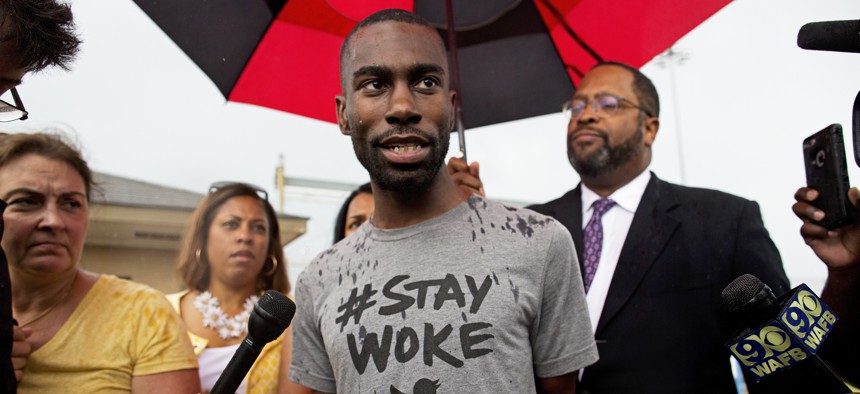State Legislatures Are the Next Battleground for Black Lives Matter

Black Lives Matter activist DeRay Mckesson talks to the media after his release from the Baton Rouge jail in Baton Rouge, La. (AP Photo / Max Becherer, File)
It’s the first time the movement has deployed a nationwide call to action at the state level.
Black Lives Matter has taken the saying “all politics is local” to heart.
A new initiative to come out of the movement seeks to refocus activist energy on the policies being enacted at the state level, according to the Associated Press.
The Black Lives Matter statehouse project revolves around OurStates.org, a new online platform. With the help of tools on “Our States,” users can choose the issues that matter to them—immigration, policing, reproductive justice, etc.—and remain up-to-date on pending relevant legislation.

The platform also comes with a guide to targeting activism at the state level with information on the issues that states do and do not control, and a six-step list to “influence your state legislator.” The list starts off with a basic, but crucial first step: “find out who your state legislators are.”
The site is yet another indication that progressive causes are beginning to catch on to something that, some might argue, is old news for conservative activists: While Congress remains stagnant on major political issues, state legislatures have been very busy and effective, vehicles for an increasingly Republican agenda.
After the 2016 elections, Republicans hold 33 governors’ offices and control both chambers in 33 statehouses. In 25 of those states, the GOP controls both the governor’s mansion and the legislature. In total, the elections in November brought about an era of GOP state government dominance not seen for more than a half century.
This certainly isn’t the first time the Black Lives Matter movement has taken on local causes. Activism associated with the group first got its start during the protests in Ferguson, Missouri, over the 2014 fatal shooting of Michael Brown by a white police officer. Activists DeRay Mckesson and Brittany Packnett—who met during the Ferguson demonstrations and went on to co-found Campaign Zero, a national campaign to end police violence—are behind the “Our States” project.
But, despite a track record of activism around local issues, this is the first time BLM has attempted to deploy a civic engagement strategy aimed at government in all 50 states.
Quinn Libson is a Staff Correspondent for Government Executive’s Route Fifty based in Washington, D.C.
NEXT STORY: Montana Awaits Chronic Wasting Disease That’s on Its Doorstep






